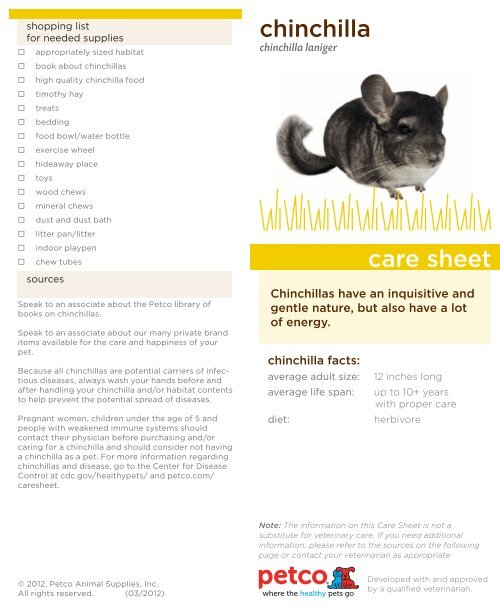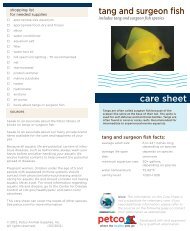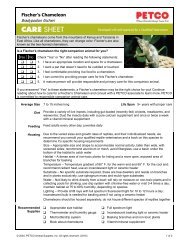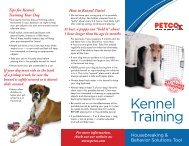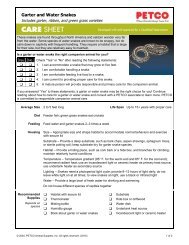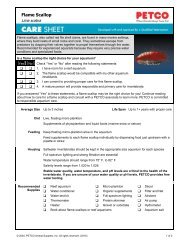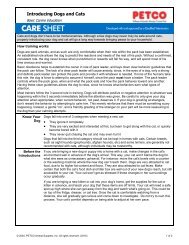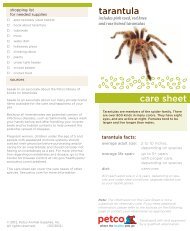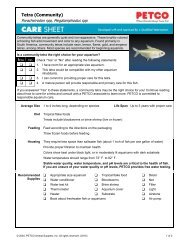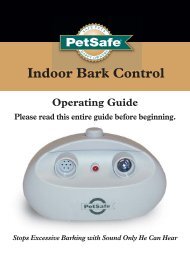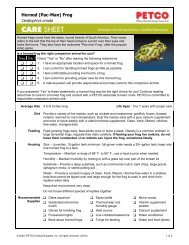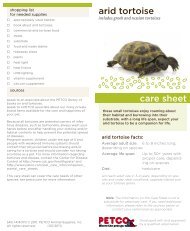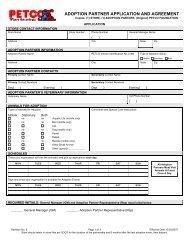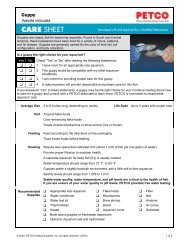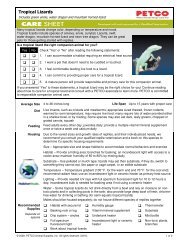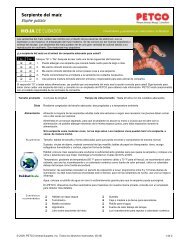Chinchilla Care Sheet (PDF) - Petco
Chinchilla Care Sheet (PDF) - Petco
Chinchilla Care Sheet (PDF) - Petco
Create successful ePaper yourself
Turn your PDF publications into a flip-book with our unique Google optimized e-Paper software.
shopping list<br />
for needed supplies<br />
appropriately sized habitat<br />
book about chinchillas<br />
high quality chinchilla food<br />
<br />
<br />
<br />
<br />
<br />
<br />
<br />
<br />
<br />
<br />
<br />
<br />
<br />
timothy hay<br />
treats<br />
bedding<br />
food bowl/water bottle<br />
exercise wheel<br />
hideaway place<br />
toys<br />
wood chews<br />
mineral chews<br />
dust and dust bath<br />
litter pan/litter<br />
indoor playpen<br />
chew tubes<br />
sources<br />
Speak to an associate about the <strong>Petco</strong> library of<br />
books on chinchillas.<br />
Speak to an associate about our many private brand<br />
items available for the care and happiness of your<br />
pet.<br />
Because all chinchillas are potential carriers of infectious<br />
diseases, always wash your hands before and<br />
after handling your chinchilla and/or habitat contents<br />
to help prevent the potential spread of diseases.<br />
Pregnant women, children under the age of 5 and<br />
people with weakened immune systems should<br />
contact their physician before purchasing and/or<br />
caring for a chinchilla and should consider not having<br />
a chinchilla as a pet. For more information regarding<br />
chinchillas and disease, go to the Center for Disease<br />
Control at cdc.gov/healthypets/ and petco.com/<br />
caresheet.<br />
chinchilla<br />
chinchilla laniger<br />
chinchilla facts:<br />
average adult size:<br />
average life span:<br />
diet:<br />
care sheet<br />
<strong>Chinchilla</strong>s have an inquisitive and<br />
gentle nature, but also have a lot<br />
of energy.<br />
12 inches long<br />
up to 10+ years<br />
with proper care<br />
herbivore<br />
Note: The information on this <strong>Care</strong> <strong>Sheet</strong> is not a<br />
substitute for veterinary care. If you need additional<br />
information, please refer to the sources on the following<br />
page or contact your veterinarian as appropriate.<br />
© 2012, <strong>Petco</strong> Animal Supplies, Inc.<br />
All rights reserved. (03/2012)<br />
Developed with and approved<br />
by a qualified veterinarian.
care sheet<br />
chinchilla<br />
chinchilla laniger<br />
Developed with and approved<br />
by a qualified veterinarian.<br />
diet<br />
A well-balanced chinchilla diet<br />
consists of:<br />
• High-quality chinchilla<br />
pellets and limited amounts<br />
of vegetables and fruits.<br />
• Provide timothy hay at all<br />
times.<br />
• Clean, fresh, filtered,<br />
chlorine-free water,<br />
changed daily.<br />
• Do not feed chocolate,<br />
caffeine or alcohol as these<br />
can cause serious medical<br />
conditions. Avoid sugar and<br />
high fat treats.<br />
feeding<br />
Things to remember when<br />
feeding your chinchilla:<br />
• Fresh food (pellets and hay)<br />
and water should always be<br />
available.<br />
• Limited amounts of<br />
vegetables and fruits as a<br />
treat.<br />
• Vegetables and fruits not<br />
eaten within 24 hours<br />
should be discarded.<br />
• Remember, treats should<br />
not exceed 10% of total<br />
food intake.<br />
housing<br />
• <strong>Chinchilla</strong>s acclimate well<br />
to average household<br />
temperatures, not to<br />
exceed 80°F; be cautious<br />
of extreme temperature<br />
changes. The habitat should<br />
never be in direct sunlight<br />
or in a drafty area.<br />
• A large multi-tiered habitat<br />
is recommended because<br />
chinchillas love to jump and<br />
play; wire habitats with a<br />
solid bottom are required to<br />
protect their feet. The space<br />
between the wires should<br />
not be bigger than one inch.<br />
It is best to provide the<br />
largest habitat possible.<br />
• 1-2 inches of bedding should<br />
be placed in the habitat;<br />
proper bedding includes<br />
high quality paper bedding,<br />
crumbled paper bedding, or<br />
hardwood shavings. Cedarbased<br />
products are not<br />
recommended.<br />
• Different types of small<br />
animals should not be<br />
housed together.<br />
normal<br />
behavior<br />
• Play during the night<br />
and rest during the day<br />
(nocturnal).<br />
• A well-socialized chinchilla<br />
likes to be cuddled and<br />
carried.<br />
• Chews on objects to<br />
maintain all their teeth,<br />
which grow continuously;<br />
Ensure they have plenty of<br />
wood chew sticks.<br />
habitat<br />
maintenance<br />
• Clean the habitat and its<br />
contents at least once a<br />
week with mild soap and<br />
water, rinse and allow to dry<br />
completely before placing<br />
the chinchilla back into the<br />
habitat.<br />
• Remove wet spots daily;<br />
change bedding at least<br />
once a week, or more often<br />
as necessary.<br />
grooming<br />
& hygiene<br />
• <strong>Chinchilla</strong>s require a<br />
dust bath at least twice a<br />
week; remove dust after<br />
15-30 minutes. Fur may be<br />
brushed with a soft brush.<br />
• <strong>Chinchilla</strong>s stay clean and<br />
rarely need baths, but can<br />
be spot cleaned with a<br />
damp washcloth if needed.<br />
• Consult with a veterinarian<br />
if a chinchilla’s teeth or nails<br />
seem too long.<br />
signs of a<br />
healthy animal<br />
• Active, alert, and sociable<br />
• Eats and drinks regularly<br />
• Healthy fur and clear eyes<br />
• Breathing is clear and walks<br />
normally<br />
• <strong>Chinchilla</strong>s are born with<br />
white teeth, but over times,<br />
their teeth turn yellow;<br />
cleaning is not necessary.<br />
red flags<br />
• weight loss<br />
• abnormal hair loss<br />
• diarrhea or dirty<br />
bottom<br />
• distressed breathing<br />
• lethargic<br />
• eye or nasal<br />
discharge<br />
• skin lesions<br />
• overgrown teeth<br />
If you notice any of these signs, please contact your<br />
exotic animal veterinarian.<br />
common health issues<br />
Health Issue Symptoms or Causes Suggested Action<br />
diarrhea<br />
eye irritations<br />
heat stroke<br />
loose stool caused by poor<br />
diet, stress, internal parasites,<br />
unclean housing, or other<br />
illness.<br />
from dust, bed shavings or<br />
infection.<br />
an emergency condition;<br />
symptoms include heavy<br />
panting, seizures, loss of<br />
consciousness.<br />
consult with an exotic<br />
animal veterinarian to<br />
determine cause and<br />
treatment.<br />
consult with an exotic<br />
animal veterinarian.<br />
can be fatal; consult<br />
with an exotic<br />
animal veterinarian<br />
immediately.<br />
malocclusion overgrown teeth. consult with an exotic<br />
animal veterinarian to<br />
possibly have teeth<br />
trimmed regularly.<br />
mites<br />
ringworm<br />
external parasites that cause<br />
chinchillas to lose patches<br />
of hair.<br />
skin infection caused by a<br />
fungus.<br />
consult with an exotic<br />
animal veterinarian<br />
for treatment.<br />
consult with an exotic<br />
animal veterinarian<br />
for treatment.


